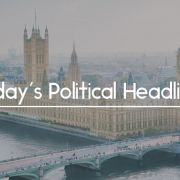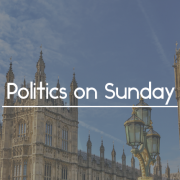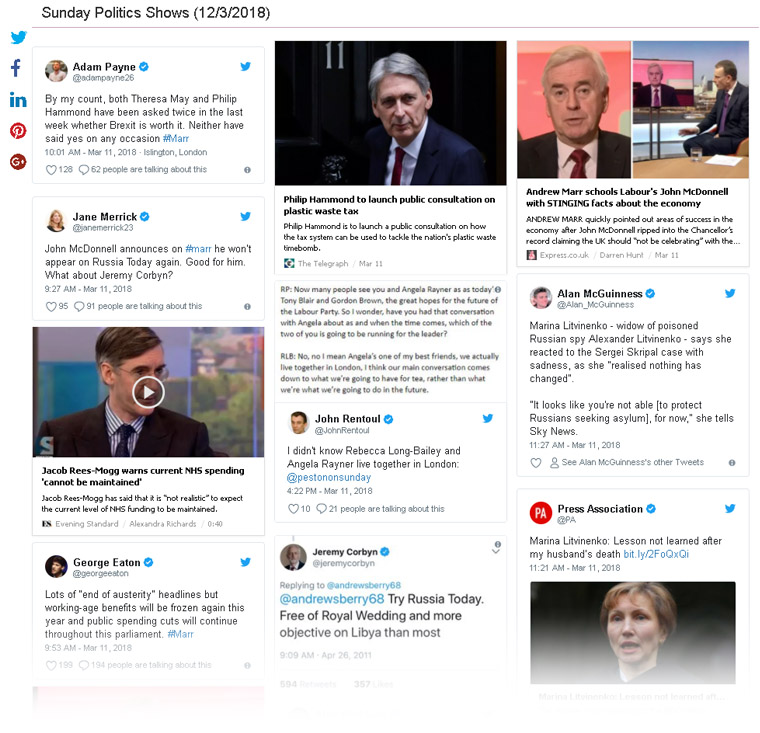Today’s Political Headlines – 13 March 2018
Today’s Political Headlines include Russia’s midnight deadline(!), today’s Spring statement, Karl Turner accused of sexual harassment and the £2bn cost of Brexit preparations.
Russia given midnight deadline to explain its actions
The Times reports that Theresa May has given Russia until midnight to account for its actions in the poisoning case. If there is ‘no credible response’, retaliatory measures might include a cyberattack, and the Prime Minister has hinted that the Government will drop its opposition to the ‘Magnitsky amendment’, which would make it easier to confiscate the assets of human rights abusers. The BBC reports that Jeremy Corbyn’s response has been controversial, as he criticised Conservatives for accepting donations from ‘Russia oligarchs’.
Spring statement to contain overhaul of VAT statement
The Daily Telegraph claims the Philip Hammond will announce an overhaul of the VAT system to benefit small traders and entrepreneurs in the spring statement today. The Times reports that other consultations will be on technology companies and plastics. The Guardian says Iain Duncan Smith has called on the Chancellor to reverse cuts to Universal Credit.
Karl Turner accused of making sexual remarks to cancer victim
The Times says that the number of Labour MPs facing bullying and sexual harassment allegations grew to six after Karl Turner was accused of slapping and making crude comments to a cancer survivor. The Daily Telegraph claims Speaker John Bercow is under pressure over claims that he used taxpayers money to suppress allegations against him.
Brexit preparations to cost Government £2bn
Institute for Government analysis suggests the Government is likely to have spent £2bn on Brexit preparations by the time that the UK leaves the EU in March 2019, with 10,000 extra roles being created in six core Whitehall departments, the Financial Times reports.
Home Office keeping torture victims in detention
The Guardian says that an inspection report into Harmondsworth immigration removal centre shows that the Home Office is detaining torture victims despite accepting evidence of their vulnerability. Concerns were also raised about security, safety and respect.
Brexit negotiators ‘closing in on securing a deal on the transition period’
According to The Daily Telegraph, Brexit negotiators ‘are closing in on securing a deal on the transition period’, and aiming for agreement at the March 22 European Council summit. Sources said that the European Commission was ‘impressed’ by the British negotiating team.
University strike may be called off
The Guardian says that strikes by university staff could be called off after a revised pension reform proposal was agreed by employers and union officials. It will be considered today by the University and College Union’s higher education committee and branch representatives.
Military childcare scheme to be axed
The Daily Mirror reports the Government is planning to axe a childcare scheme used by around 10,000 military personnel, alongside other ‘childcare vouchers’ and replaced by ‘tax-free childcare’, which the paper says is ‘less generous’. A vote will be held today.
Find out more about Vuelio Political services and what they can do to help you.


















 Jenifer Stirton is the Director of Stockbridge PR
Jenifer Stirton is the Director of Stockbridge PR Sarah Stimson is the chief executive of the Taylor Bennett Foundation
Sarah Stimson is the chief executive of the Taylor Bennett Foundation Jennifer Thomas is the Head of Internal Communications, Experience & Sustainability at Direct Line Group
Jennifer Thomas is the Head of Internal Communications, Experience & Sustainability at Direct Line Group
 Ronke Lawal is the founder of Ariatu PR and sits on the board of the CIPR
Ronke Lawal is the founder of Ariatu PR and sits on the board of the CIPR Sarah Pinch is the managing director of Pinch Point Communications and chair of the Taylor Bennett Foundation
Sarah Pinch is the managing director of Pinch Point Communications and chair of the Taylor Bennett Foundation Jo-ann Robertson is CEO of Ketchum London
Jo-ann Robertson is CEO of Ketchum London
 Shamima Begum is an executive director at Golin
Shamima Begum is an executive director at Golin Sarah Hall is a PR and marketing agency owner, founder of #FuturePRoof and President of the Chartered Institute of Public Relations (CIPR) for 2018
Sarah Hall is a PR and marketing agency owner, founder of #FuturePRoof and President of the Chartered Institute of Public Relations (CIPR) for 2018 Bibi Hilton is the president of Women in PR and MD of Golin London
Bibi Hilton is the president of Women in PR and MD of Golin London







